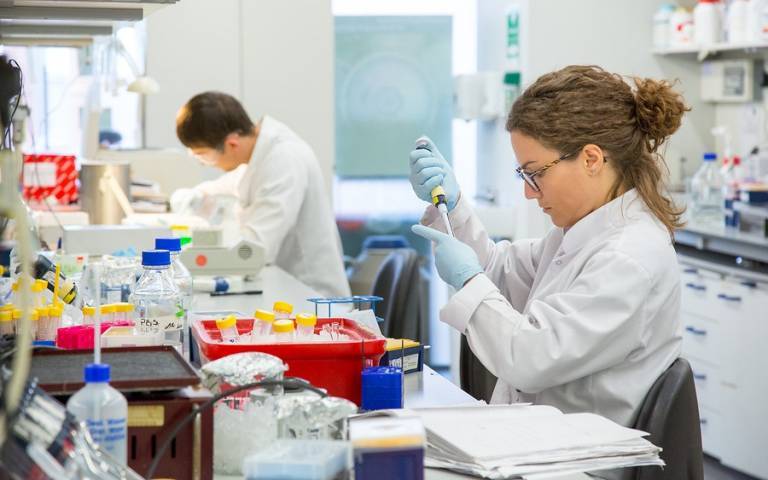UCL spinout raises £117m to trial ‘pioneering’ cell therapy
3 December 2021
Quell Therapeutics (Quell), a biopharmaceutical UCL spinout, has raised £117 million ($156m) to trial its pioneering T Regulatory (Treg) cell therapy, designed to prevent organ rejection in liver transplant patients.

The oversubscribed Series B financing round was co-led by Jeito Capital, Ridgeback Capital Investments, SV Health Investors and Fidelity Management & Research Company LLC. Founding investor Syncona also participated in the financing round.
Quell was formed in 2019 by leading academics from UCL, King’s College London and Hannover Medical School, including UCL Professors Hans Stauss and Emma Morris (both UCL Division of Infection & Immunity) – who have over fifteen years of experience in T cell engineering and gene therapy clinical trials.
The company was spun-out with support from UCL Business (UCLB), UCL’s commercialisation company.
Quell is developing a Multi-Modular Engineered T Regulatory (Treg) Cell Therapy platform for transplantation, neuroinflammatory and autoimmune diseases, with the goal of enabling transplant patients and patients with autoimmune conditions to live without taking conventional immunosuppressive medication.
Professor Hans Stauss, Director of UCL Institute of Immunity and Transplantation, said: "It is exciting to work at the cutting edge of developing new life medicines for autoimmune conditions and for transplant patients.
“The investment in Quell provides the opportunity to translate our research discoveries into new therapies for patients."
Professor Emma Morris, Director of UCL Division of Infection and Immunity, said: “The clinical use of genetically engineered immune cells over the last five years has transformed the management of many cancers and it is now time to test whether patients with other immune-mediated diseases can benefit from similar approaches.”
Regulatory T Cells are known as the “master modulators” of immune homeostasis, and are designed to suppress overactive immune responses, drive long-term tolerance in the local immune environment and promote tissue repair.
Quell’s versatile platform technology enables the company to design, engineer and manufacture therapeutic Treg products at scale.
Proceeds from the financing round will be used to fund the LIBERATE Phase 1/2 clinical trial of QEL-001. This is a first-in-class antigen-specific multi-modular CAR-Treg cell therapy candidate designed to prevent organ rejection in liver transplant patients by inducing durable immune tolerance and eliminating the need for lifelong immunosuppression.
Professor David Price, UCL Vice-Provost (Research, Innovation & Global Engagement) said: “Quell’s innovative Treg cell therapy has the potential to materially transform patients’ lives. Going from bench to bedside in such a short amount of time is testament to what can be achieved through collaboration across institutions and borders.
“I commend the team of researchers, business development managers and investors whose hard work and commitment have brought Quell to this stage and wish them all the best for the future.”
Luke Henry, Quell’s Chief Business Officer, said: “Patients who require liver transplants live on a cocktail of immunosuppressants for the rest of their lives.
“Because the drugs are suppressing the entire immune system, over time that leads to increased rates of cancer and opportunistic infections, as well as cardiovascular issues and kidney problems associated with side effects of the immunosuppressant drugs themselves.
“We’ve come a long way in two years, from selecting the first clinical candidate, to building out our manufacturing capability, getting the investment needed to grow the company and now being on the cusp of filing for regulatory approval to go into the clinic with our first programme.”
UCL spinouts and startups are not only helping to bring potentially life-changing treatments close to patients, they also help attract external investment into the UK, creating jobs and driving innovation. In 2019/20, UCL spinouts and startups employed over 3,000 people, and between 2018-2020 attracted over £1bn of external investment.
Links
- Original article in The Conversation
- Quell Therapeutics
- UCLB
- Innovation & Enterprise support for UCL staff
- Academic profile: Professor Hans Stauss
- Academic profile: Professor Emma Morris
- UCLB in conversation with Apollo Therapeutics
- King's College London
- Hannover Medical School
Further information
- Source: UCL News
- Media Contact: Poppy Danby
 Close
Close

